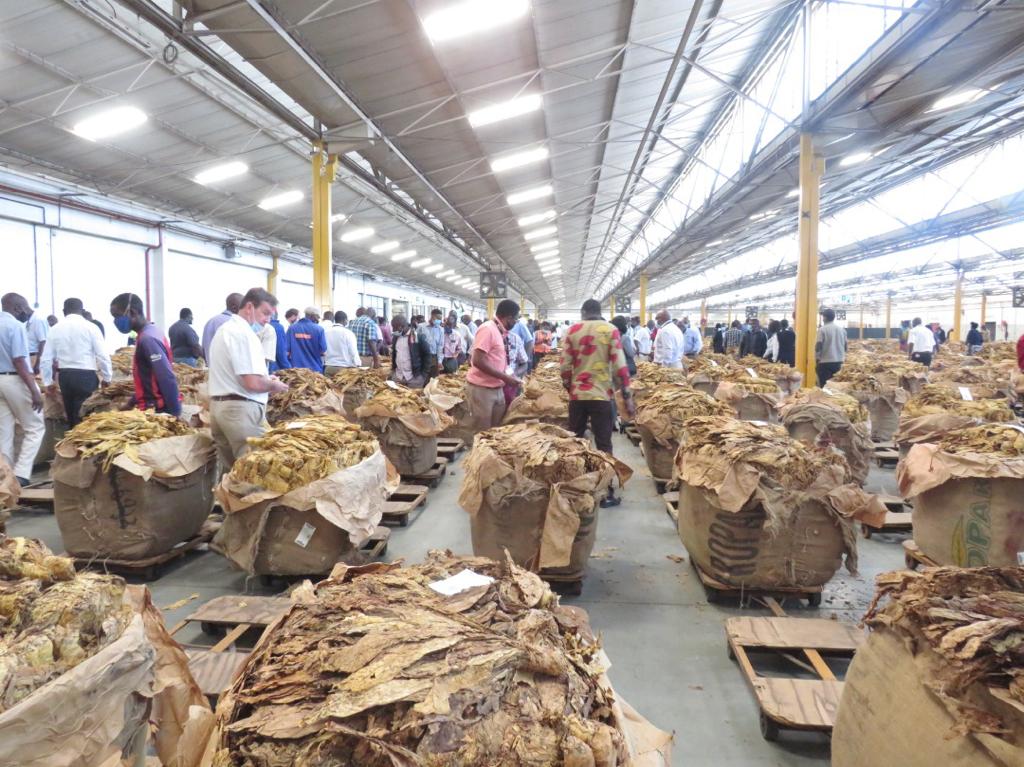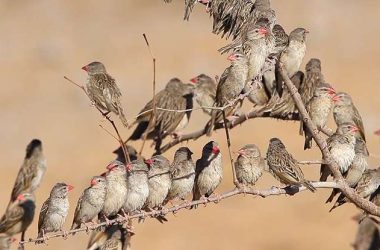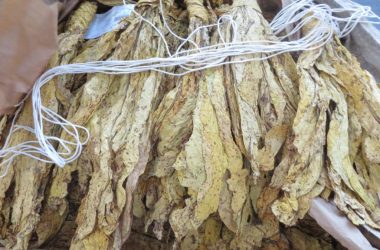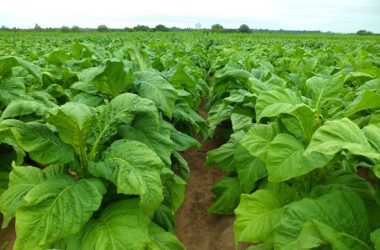
By Conrad Mwanawashe
The 2022 tobacco crop is generally fair to good quality coming off a season characterised by a late and false start of the rains, followed by incessant and excessive rains in January causing water logging, nutrient leaching, and disrupting weeding and other agronomic operations, according to the Minister of Lands, Agriculture, Fisheries, Water and Rural Development, Dr Anxious Jongwe Masuka.
There were also incidences of some bacterial diseases, particularly angular leaf spot.
Dr Masuka was officiating at a ceremony to mark the start of 2022 tobacco marketing season, Tuesday.
“Although a higher irrigated crop was grown, planting of the late dry-land crop had to be extended into January. This adversely affected yield and expected total production. Climate-proofing of tobacco production is clearly required and I hope more investments in irrigation development will be made at then small holder sector level,” Dr Masuka said.
For this marketing season, 110,155 hectares of tobacco was planted by 122,841 growers with around 600 growers having registered for the first time.
The Tobacco Industry and Marketing Board (TIMB) licensed 3 auction floors, Tobacco Sales Floor (TSF), Boka Tobacco Floors (BTF) and Premier Tobacco Auction Floor (PTAF) for the marketing season.
The Board also licensed 35 “A” Class buyers and 33 contracting companies and approved decentralized contract sales to be conducted at five designated centres, which are Karoi, Mvurwi, Bindura, Marondera and Rusape.
Small scale farmers contribute immensely to the volume and quality of tobacco produced in Zimbabwe. In the 2021 marketing season, 133 million kilograms of the 211 million kilograms sold were produced by small scale farmers?
Minister Masuku applauded the farmers who are at the core of Tobacco Transformation Plan. The viability of the farmer is at the epicentre of the future of the industry.
“You are part of this great building project for this great Vision. Through the Tobacco Transformation Plan, we will build this industry “Brick by brick and stone upon stone” to a US$5 billion industry by 2025,” he added.
Government approved the Tobacco Transformation Plan last year whose core objectives are (a) to increase production to 300 million kg annually of good quality styles desired by the international market, (b) to increase productivity to 2000kg/ha, through vertical growth and loss reduction (c) to increase value addition and beneficiation to 30% of the crop by 2025 from the current 2%, (d) to localize the financing of tobacco by injecting seed funds of at least USD 60 million, and to attend to the enablers of (e) accelerating research and innovation (f) exploring alternate and alternative crops (g) attending to matters of sustainability, traceability, and good agricultural practices, including ethical use of labour.
But to achieve the targets and objectives of the transformation plan, perennial challenges and complaints by farmers and other actors along the whole value chai needed to be addressed.
“The rebranded TIMB must consider these issues holistically and find long-lasting solutions. The TIMB should aspire to achieve better livelihoods for farmers and sustainability for the tobacco industry, and we all need to rally and support these great endeavours. Their byline is now “For Livelihoods. For Sustainability”. I urge the TIIMB to live up to this mantra.”
TIMB Vice Chairperson Nomusa Dube said concerns have been raised with regards to growers facing viability challenges because of increased cost of production. Prices of inputs really gone up. And to alleviate some of these challenges, authorities were working on better alternative sources of funding and focusing on addressing issues of local funding, sustainable tobacco production, the regulatory framework as well as value addition and beneficiation to improve viability of tobacco growers.
“The industry together with the Reserve Bank of Zimbabwe have jointly put in place improved payment measures to ensure that tobacco growers get full value for their crop and are simultaneously paid within the shortest possible time. They are our economic heroes and we applaud their dedication,” said Dube.
Minister Masuku said that more should be done to ensure transparency in contracting, adhering to agreed terms, and executing obligations and responsibilities timeously.
Frustration has been reported with some contractors giving farmers inadequate input packs and very late yet they will eventually want the whole crop and this may lead to undesirable side-marketing.
Side marketing is a form of contract default where a contracted tobacco grower sells his/her tobacco to a third party in breach of a legally binding contractual agreement which states that contracted tobacco shall only be sold to or bought by the licenced contractor who provided inputs to such a grower. (Which is an offence under S24 of the Farmers Stop-Order Act [Chapter 18:11] as well as under S5(1) of SI61of 2004
Side marketing is also a form of breach of law when auction tobacco is sold otherwise than through auction floors in breach of S40 of the Tobacco Industry and Marketing Act [Chapter 18:20]
“I have previously suggested that in addition to a minimum support package by Contractors, Contractors should be obligated to provide transport to ferry the crop.”
“Discipline among actors is required. The TIMB has an Inspectorate Unit created to deal with errant behaviour. All stakeholders should act to eliminate the perceived farmer deprivation while enhancing transparency and fairness in tobacco sales at both contract and auction sales.
Reports of higher prices at contract sales compared to auction sales for similar grade and reports of collusion by merchants and manouevers by middlemen to re-handle tobacco bought cheaply from farmers should be a thing of the past. I am recommending the TIMB Inspectorate Unit to continue to work with other security agencies to eliminate these vices. Discipline must return to this important industry. Contractors should provide the prescribed minimum support package for both smallholder and commercial farmers and farmers must repay this support through delivery of the crop to contractors while avoiding side-marketing.”











